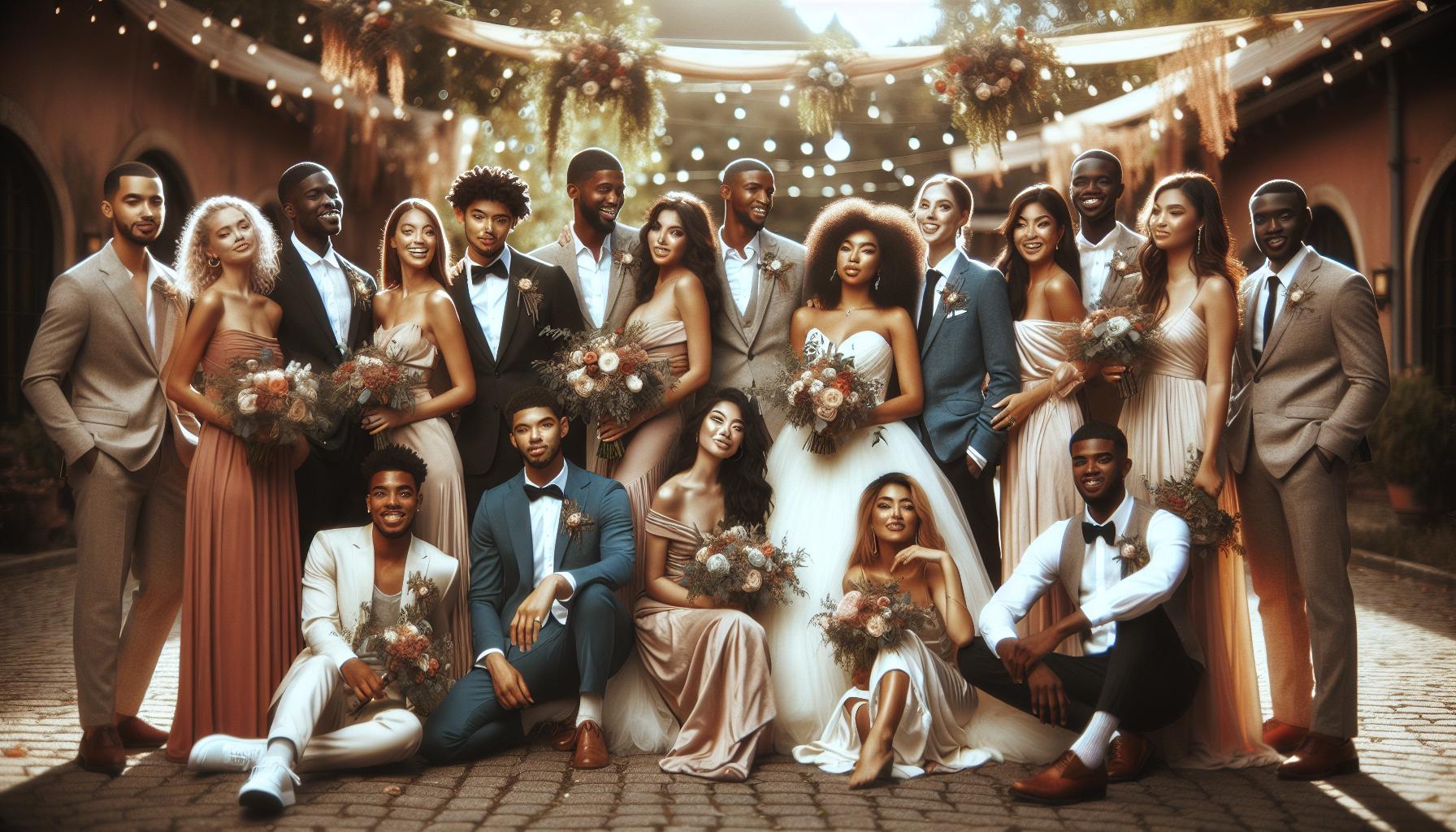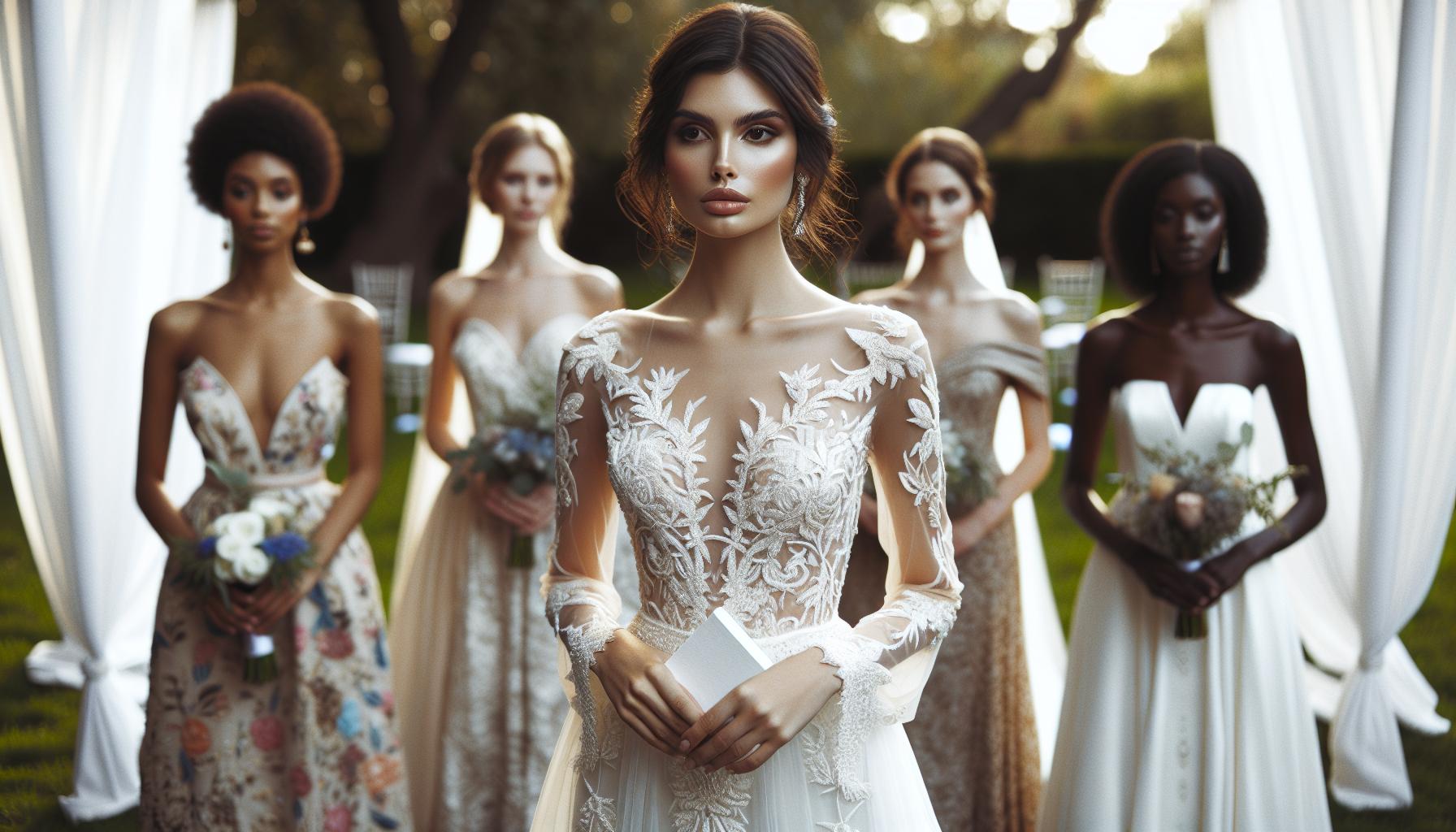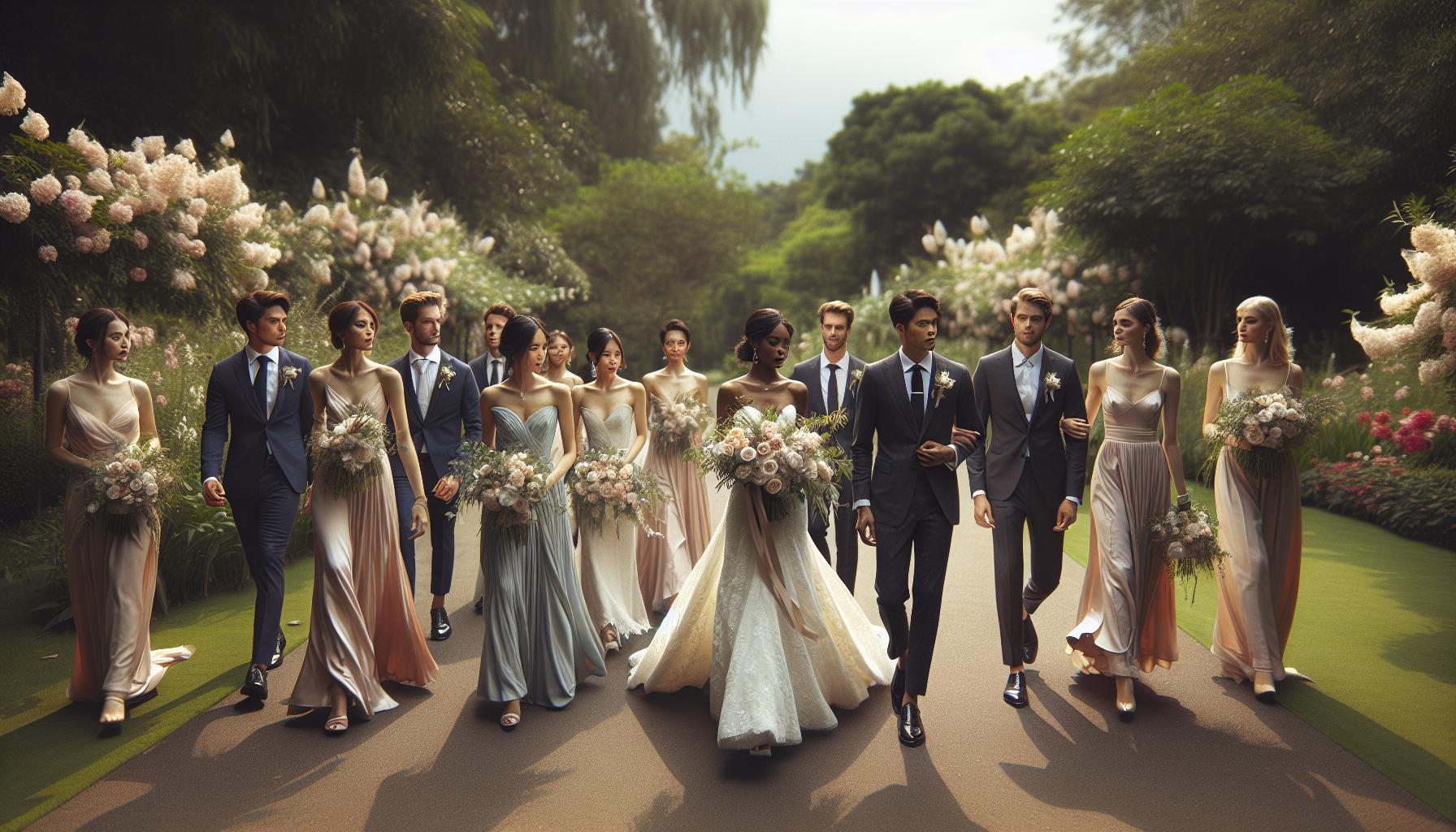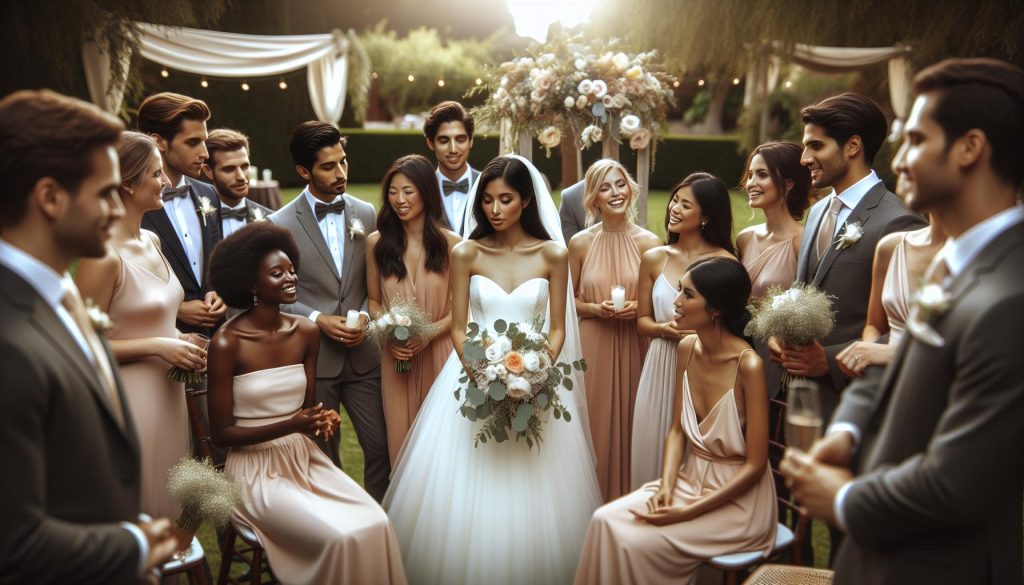Planning a wedding is not just about choosing a stunning venue or the perfect dress; it’s also about understanding the vital roles your wedding party will play in making your day unforgettable. Each member, from the best man to the bridesmaids, carries unique responsibilities that contribute to the overall celebration. In “Who Is the Bride: Complete Wedding Party Roles & Responsibilities,” we’ll delve into each role’s significance, providing you with insights and tips to ensure everyone feels valued and knows what to expect. Whether you’re navigating traditional customs or modern interpretations, understanding these roles can alleviate stress and foster a sense of unity among your crew. Join us as we explore how each person can support you on your journey toward a memorable wedding day, allowing you to focus on celebrating love and togetherness.
Who Makes Up the Wedding Party? A Complete Guide

Planning a wedding is a joyous experience filled with love and anticipation, and understanding the wedding party can elevate the celebration even further. The wedding party typically comprises those closest to the couple, who play vital roles in both the ceremony and the lead-up to the big day. This entourage helps not just to formalize the occasion but also provides much-needed support to the couple throughout the planning process and on the wedding day itself.
The core of the wedding party is usually formed by the bride and groom, their maids of honor and best men, and the bridesmaids and groomsmen. Each of these roles carries specific expectations and responsibilities that contribute significantly to the smooth execution of the event. The maid of honor, for instance, is often the bride’s confidante, assisting with everything from dress planning to organizing the bridal shower. The best man, on the other hand, is the groom’s right-hand man, in charge of coordinating the groomsmen and delivering a heartfelt toast.
Additionally, roles like ushers and flower girls add a delightful touch of charm and organization to the ceremony. Ushers guide guests to their seats, ensuring everything runs without a hitch, while flower girls, often adorable little family members, enhance the ceremony’s beauty by scattering petals down the aisle. Parents of the couple also play significant roles-traditionally, they may assist with planning or hosting aspects, and their presence adds emotional depth to the day.
In many modern weddings, couples are now embracing unique or honorary positions, such as having a friend serve as a “best woman” or including pets in the ceremony. Moreover, cultural variations can influence the structure of the wedding party, with customs dictating specific roles and rituals that can add meaningful context to the celebration. Overall, assembling your wedding party is not just about filling positions; it’s an opportunity to celebrate relationships, express gratitude, and create lasting memories together.
Understanding the Role of the Bride

The bride stands at the heart of the wedding, embodying love, joy, and the hope for a beautiful future. As the central figure on this special day, her role encompasses various emotional, logistical, and aesthetic responsibilities that ensure the celebration unfolds seamlessly. From selecting the perfect wedding dress to coordinating with vendors and expressing gratitude to attendees, the bride’s involvement is multi-faceted and deeply personal.
One of the primary duties of the bride is to communicate her vision for the wedding. This includes determining the theme, color palette, and overall style. As she collaborates with key players such as the wedding planner, florist, and caterer, her preferences shape every detail, from floral arrangements to the cake design. The planning process is not just about making choices; it’s about creating an atmosphere that resonates with the couple’s unique love story. Along the way, the bride often receives support from her maid of honor and bridesmaids, who assist in tasks like dress fittings and organizing pre-wedding events.
During the wedding day, the bride’s responsibilities take center stage. As she prepares for her walk down the aisle, an aura of anticipation fills the air. Moments before the ceremony, she should take time for a moment of reflection, breathing in the excitement and significance of the day. It’s essential for the bride to ensure that her family and wedding party are informed and ready, leading to a smooth processional. Opening her heart as she vows to love and cherish her partner marks a profound transition, setting the tone not just for the ceremony but for the marriage ahead.
Beyond attire and planning logistics, the bride plays a crucial role in fostering relationships with those involved in the festivities. This includes personal touches like handwritten notes for bridal party members, thanking them for their support, or meaningful gestures during the reception. By nurturing these connections, she enriches the experience for everyone involved, transforming a simple celebration into a cherished collective memory. With grace and intention, the bride becomes the heart of the celebration, symbolizing love, friendship, and commitment as she embarks on this transformative journey.
Key Responsibilities of the Maid of Honor
The maid of honor holds a pivotal role in the wedding party, often serving as the bride’s right hand and confidante. This position involves a delightful mix of emotional and logistical responsibilities, ensuring the bride feels supported throughout her wedding journey. From organizing pre-wedding events like bridal showers and bachelorette parties to helping the bride navigate the whirlwind of wedding planning, the maid of honor’s contributions are invaluable. In this celebratory role, she not only adds joy to the festivities but also eases the pressure on the bride, allowing her to focus on the love that the day represents.
One of the key responsibilities is to assist the bride in dress selection and fittings. This includes accompanying her to try on gowns, providing constructive feedback, and even helping with styling decisions. Additionally, the maid of honor often coordinates the details related to the bridal party’s attire, ensuring that everyone is on the same page regarding dresses or suits, accessories, and any necessary alterations. During the wedding day itself, she plays a crucial role in organizing the bridal party, ensuring everyone is prepared and where they need to be at the right times.
Day-of Duties
As the wedding day unfolds, the maid of honor’s responsibilities shift into high gear. She acts as a point of contact for the bridal party, managing logistics, and troubleshooting any last-minute hiccups. Whether it’s holding onto the bride’s bouquet during the ceremony or calming her nerves before the walk down the aisle, her presence is vital. Here are some specific duties typically expected of the maid of honor:
- Assist the bride with getting ready, including hair and makeup coordination.
- Serve as a personal assistant on the wedding day, keeping track of the schedule.
- Support the bride emotionally, offering encouragement and helping her stay relaxed.
- Deliver any personal items the bride may need throughout the day.
Another important aspect of the maid of honor’s role is to give a heartfelt toast during the reception, celebrating the couple and sharing personal anecdotes that capture their love story. This moment is not only a privilege but a means of honoring the couple’s journey and the cherished memories they’ve created.
With a keen awareness of etiquette and event flow, the maid of honor ensures everyone is engaged and having fun, making the celebration seamless. By stepping into this multifaceted role, she doesn’t just support the bride but also contributes to the creation of lasting memories for all involved, solidifying her place as a cherished part of this beautiful day.
Duties of the Best Man Explained

The role of the best man is not only a privilege, but also a significant responsibility that adds to the wedding day’s joy and structure. Tasked with supporting the groom, the best man serves as his steadfast ally throughout the entire wedding planning process and on the big day itself. This special relationship often deepens the celebration, showcasing a bond that typically spans years. With an array of duties that combine both fun and serious elements, the best man plays a vital part in ensuring the day runs smoothly and that the groom feels supported every step of the way.
One of the primary responsibilities of the best man is to assist the groom in preparing for the wedding. This includes everything from accompanying him to fittings for his wedding suit to helping him organize pre-wedding festivities like bachelor parties. It’s essential for the best man to be proactive, ensuring that the groom is not overwhelmed by the numerous details and decisions that come with planning the event. Checking in regularly and maintaining open lines of communication is key to alleviating the groom’s stress.
Day-of Responsibilities
As the wedding day arrives, the best man’s duties become even more crucial. Here are some common tasks he is expected to handle:
- Assist the groom with getting ready, ensuring he has everything he needs, from his attire to necessary personal items.
- Keep track of the wedding day timeline, ensuring that the groom and groomsmen stay on schedule.
- Deliver any items the groom may require during the ceremony, including the rings-ensuring they are safely secured until needed.
- Serve as the main point of communication between the groom and other wedding party members, helping coordinate movements and ensuring that everyone is informed.
- Stand by the groom during the ceremony, providing moral support and maintaining a calming influence.
Once the ceremony concludes, the best man often has the honor of delivering a speech during the reception. This moment is not only an opportunity to share heartfelt sentiments about the couple but also to add a touch of humor and charm that engages guests. Crafting a thoughtful and memorable toast is a rite of passage for the best man, creating lasting memories for both the couple and all those in attendance.
Ultimately, the best man enhances the entire wedding experience, acting as a trusted confidant and organizer. His support helps bring the groom’s vision to life, ensuring that the celebration is as joyful and seamless as possible. In doing so, he contributes not just to a memorable day but to the cherished journey of love that the couple undertakes.
The Importance of Bridesmaids and Groomsmen
The bond formed among bridesmaids and groomsmen is not just about standing next to the couple on their big day; it embodies a profound expression of love and support that transcends the ceremony. These cherished friends and family members play a pivotal role in creating lasting memories, not only through their presence but also through their emotional and logistical backing during the planning and execution of the wedding.
Bridesmaids are invaluable in their support of the bride. They assist in selecting attire, throwing bridal showers, and organizing pre-wedding events that enhance the excitement leading up to the big day. Their involvement can alleviate some of the stress associated with wedding planning, as they often help with details ranging from addressing invitations to arranging floral decorations. On the wedding day itself, bridesmaids ensure the bride looks her best and stays calm amid the whirlwind of activity. Their teamwork brings a sense of harmony and joy, emphasizing the shared celebration of love.
Similarly, groomsmen carry an essential responsibility in supporting the groom. Their roles often include planning bachelor parties and helping to coordinate the logistics of the wedding day. By keeping the groom’s spirits high and him stress-free, groomsmen contribute significantly to the overall atmosphere of the celebration. Each groomsman brings a unique perspective and charm, enhancing the camaraderie among the bridal party and guests alike.
Creating a Supportive Environment
The significance of bridesmaids and groomsmen extends beyond immediate tasks; they foster a collective sense of community and unity. Here are some ways to maximize their impact:
- Open Communication: Regular check-ins help ensure everyone is on the same page regarding their responsibilities, schedule, and any necessary changes.
- Encourage Participation: Involve them in decision-making processes, allowing their personalities and preferences to shine through in details like attire and decor.
- Plan Group Activities: Organizing bonding activities, such as brunches or outings, can enhance the relationships among party members, making them feel more cohesive.
Ultimately, the roles of bridesmaids and groomsmen enrich the wedding experience, providing not just logistical support but also emotional strength. Their enthusiastic presence amplifies the celebration and creates joyful moments that the couple will cherish forever. As the couple steps into their new life together, the influence of these friends and family members will linger, reminding everyone of the importance of love, laughter, and togetherness in this beautiful journey.
Additional Roles: Ushers and Flower Girls
The inclusion of ushers and flower girls in the wedding party adds delightful touches of charm and responsibility, enhancing the overall atmosphere of the celebration. Ushers serve as the welcoming committee for guests, guiding them to their seats and ensuring everything runs smoothly as the ceremony unfolds. Typically chosen from among close friends or family members, ushers play a pivotal role in creating a warm, inviting environment where guests can feel comfortable and at ease.
Ushers are often tasked with a few key responsibilities that go beyond simply directing traffic. They might help distribute programs, manage the flow of guests, and provide assistance to anyone needing special considerations. They can also help to set up the ceremony site or reception area before guests arrive. By maintaining an organized and friendly demeanor, ushers contribute significantly to the wedding’s success and enhance the couple’s peace of mind on their special day.
On the other hand, flower girls bring an enchanting element to the ceremony, capturing hearts with their innocence and charm. Typically young girls, they have the delightful task of scattering petals along the aisle, symbolizing beauty and new beginnings as they lead the way for the bride. Their presence not only adds visual elegance to the ceremony but also offers a moment of joyous spontaneity, reminding everyone present of the playful side of love and commitment.
Including ushers and flower girls in your wedding party is not just about fulfilling traditional roles; it’s about engaging loved ones in your journey and allowing their personalities to shine. When selecting ushers, consider their ability to interact well with guests and their comfort in taking on a leadership role within the wedding party. For flower girls, choose someone who is excited about the task and can handle the attention, even if it may be a bit much for younger participants. This combination of duties adds richness to the ceremony, creating lasting memories for both the couple and their guests.
Family Involvement: Parents of the Couple
The role of parents in a wedding extends far beyond traditional expectations; their involvement can significantly influence the event’s emotional richness and overall success. From the early planning stages to the final event, parents offer support, guidance, and love that can help alleviate the stress often associated with wedding preparations. Whether it’s sharing their insights on vendor choices or offering a listening ear during challenging times, their presence can transform the planning experience into a cherished family journey.
Parents typically have defined roles throughout the wedding festivities. For instance, the father of the bride traditionally escorts her down the aisle, signifying his blessing and support. This moment is poignant, marking the transition from one family to another. In addition, parents might also participate in the rehearsal dinner, offering toasts that can evoke laughter and tears alike, strengthening the bonds between families. Mothers often play pivotal roles in coordinating details, from selecting appropriate attire to ensuring family traditions are honored throughout the ceremony.
Moreover, involving parents in pre-wedding activities can foster a sense of community and familial warmth. This could include organizing family meetings to discuss wedding plans, participating in cake tastings, or even simply attending venue tours. Such collaborations not only honor the parents’ contributions but also invite their unique perspectives, creating a more inclusive atmosphere. Incorporating traditions, such as a dance with parents or special family rituals during the ceremony, allows them to feel valued and reinforces their importance in the couple’s lives.
In some cases, cultural traditions may dictate specific roles for parents that enhance the wedding’s cultural richness. For example, in many cultures, parents may be deeply involved in the ceremonial aspects, such as blessing the couple or presenting gifts that symbolize family support. Embracing these unique roles can add meaningful layers to the wedding experience, demonstrating respect for heritage and the family’s journey.
Ultimately, balancing these familial roles with the couple’s vision for the day can be straightforward with open communication and mutual respect. Planning meetings, discussions about responsibilities, and clear delineation of roles ensure everyone feels honored and involved. Encouraging parents to share their thoughts while also setting boundaries will help create a positive atmosphere that honors both the couple’s vision and the families’ contributions, making the wedding not only a celebration of love but also of family unity.
Navigating Unique Roles: Honorary Positions
When it comes to the wedding party, honorary positions can add meaningful dimensions to the celebration, reflecting personal relationships and family dynamics. These unique roles often allow loved ones to participate in ways that go beyond the traditional lineup. Assigning honorary positions can enhance the emotional depth of the event, turning cherished moments into unforgettable memories.
Honorary roles may include a variety of figures such as the officiant, who leads the ceremony, or special family members like grandparents, who might be given recognition during the proceedings. Other notable mentions could be an aunt or uncle who takes on a significant supportive role, or childhood friends who may participate in readings or shares meaningful anecdotes. These contributions not only highlight special bonds but also let guests know who holds a treasured spot in the couple’s hearts. To navigate these roles effectively, clear communication is vital. Discuss the significance of these roles with your honorary members and outline their specific responsibilities to ensure everyone is on the same page.
Considerations for Honorary Roles
- Inclusivity: Be mindful of including friends and family members who are important to you, even if they do not fit traditional roles.
- Flexibility: Adjust their duties to match their comfort levels and availability. Some may prefer a more reserved role, while others might happily take on additional responsibilities.
- Recognition: Find ways to honor these individuals during the ceremony, such as special mentions in speeches or by including them in family portraits.
To make the inclusion of honorary roles truly memorable, think about how you can honor them during the celebration. This might involve a personalized toast, a moment of recognition during the ceremony, or even a unique keepsake that symbolizes their significance in your life. These thoughtful gestures can amplify the spirit of love and connection integral to wedding celebrations, ensuring that everyone feels appreciated and valued. By embracing these roles, you create a more inclusive atmosphere, allowing for a richer tapestry of relationships to be celebrated on your special day.
Cultural Variations in Wedding Party Roles
Wedding party roles can vary significantly across cultures, adding a rich tapestry of meaning and tradition to each celebration. In many African cultures, for example, family plays a central role, with extended family members actively participating in ceremonies and festivities. The groom’s family is often involved in negotiating the bride price, reflecting the importance of familial ties and community support. In this context, the wedding party extends beyond friends and immediate family to include both sides of the family, fostering unity and mutual respect.
In contrast, traditional Asian weddings may feature specific roles such as the “ring bearer” and “flower girl,” but also include unique customs like the tea ceremony. This ritual, often hosted in the presence of close relatives, serves to honor both the bride’s and groom’s families. The bride and groom kneel and serve tea to their elders as a sign of respect, which can often be a family co-effort, blending the roles of the bridal party and family members into one meaningful occasion.
Similarly, in Western cultures, while the bride often chooses her bridesmaids and the groom his groomsmen, variations exist. Some couples opt for a more gender-inclusive wedding party, embracing friends and family members of all identities in these roles. This modern twist acknowledges the importance of personal relationships over traditional classifications, allowing a more reflective representation of the couple’s inner circle.
When planning a wedding, it’s crucial to honor these cultural nuances. Couples should engage in open conversations with families about their expectations and preferences, paving the way for an inclusive experience that honors both the couple’s wishes and their family’s traditions. Speak with loved ones to understand which roles hold significance and how they can contribute meaningfully to the celebration. By acknowledging and incorporating diverse cultural practices into the wedding party, couples create a holistic experience that resonates with the love and unity the occasion celebrates.
Tips for Communicating Responsibilities Effectively
Effective communication is the heart of a smooth wedding planning experience. With several individuals stepping into various roles, ensuring that everyone is on the same page not only alleviates stress but also enhances the joy of the journey ahead. One of the best ways to initiate this dialogue is through an open and honest conversation. Invite your wedding party to a casual meet-up-perhaps over coffee or a fun group dinner-where you can outline the responsibilities from the start. This friendly atmosphere encourages questions and clarifications, making it easier for everyone to feel comfortable voicing their thoughts.
When it comes to assigning specific tasks, detailing each person’s role is essential. Create a responsibility chart or a checklist to clarify expectations. For instance, the maid of honor might be tasked with organizing the bridal shower and helping with dress fittings, while the best man could focus on planning the bachelor party. Sharing this information through a shared digital document, such as Google Docs, allows for easy access and updates, ensuring no detail slips through the cracks. This collaborative approach reassures your wedding party that their efforts are valued and recognized.
Communicating your vision and timeline also plays a crucial part in keeping everyone aligned. Discussing the wedding schedule, including key dates and important milestones-like fittings, vendor meetings, and rehearsal dinners-helps everyone plan accordingly. Regular updates, perhaps through a group chat or a dedicated social media group, can keep the excitement alive while ensuring everyone knows what to expect. Remember to be supportive and flexible since commitments may shift and personalities may overlap; the key is to remind your team that this is a shared experience steeped in love and celebration.
Lastly, whether it’s expressing gratitude or addressing any concerns, foster an atmosphere of encouragement and understanding. Providing acknowledgment of each member’s contributions not only nurtures relationships but also strengthens the bond of your wedding party. Should any conflicts arise, approach them with empathy and openness, focusing on solutions rather than problems. This balanced communication strategy ensures a harmonious celebration where joy and unity shine through, making your wedding planning journey as memorable as the day itself.
How to Handle Conflicts and Changes in the Party
As wedding planning unfolds, it can be easy for tensions to arise among your cherished wedding party members. Navigating conflicts and adjustments is part of the journey, and addressing these moments with grace and understanding can transform challenges into opportunities for strengthening bonds. When feelings of stress surface, remember that open dialogue is vital. Creating a safe space for your party to express concerns or shifts in commitment can alleviate misunderstandings. Scheduling regular check-ins, whether virtual or in-person, can keep everyone engaged and connected, while ensuring that responsibilities remain clear.
When conflicts do emerge, approach the situation with empathy. Instead of assigning blame or allowing frustrations to fester, listen carefully to each person’s perspective. Acknowledge their feelings, reminding them of the shared joy that the wedding represents. For example, if the maid of honor feels overwhelmed with her tasks due to personal commitments, suggest reassigning duties that can lighten her load. This flexibility not only demonstrates your care for their well-being but also reinforces a supportive environment where each member feels valued.
As plans evolve, unexpected changes may also be necessary. Be prepared for potential alterations in roles, whether due to scheduling conflicts or personal circumstances. Keeping an ongoing dialogue about responsibilities and timelines allows for smoother transitions when adjustments are required. For instance, if a bridesmaid becomes unable to attend certain pre-wedding events, discuss how you can best include her in ways that still honor her commitment. This can be as simple as sharing virtual participation options or finding alternative ways for her to be involved.
Lastly, to celebrate the contributions of your wedding party and counterbalance any stress, consider planning moments of appreciation during the lead-up to the big day. Small tokens of gratitude, heartfelt notes, or even hosting a casual get-together can create a positive atmosphere that fosters camaraderie. By reinforcing the love and reason behind your special day, you’re not only cultivating a supportive team but also ensuring that your wedding planning journey feels as joyful and memorable as the celebration itself.
Celebrating Your Wedding Party with Special Moments
Every wedding journey deserves a sprinkle of joy and appreciation, especially for those who stand by you on this monumental day. Celebrating your wedding party does not just strengthen bonds; it cultivates an atmosphere filled with love and gratitude as you all prepare to embark on this new chapter together. Crafting special moments for your wedding party can make the planning process more enjoyable and affirm the valued roles each individual plays in your celebration.
One impactful way to show appreciation is through personalized gifts. Consider writing heartfelt notes expressing your gratitude for their support and friendship during this significant time. You might also create custom tokens, such as engraved jewelry or keepsake items that reflect their unique connection to you. These thoughtful gestures, no matter how simple, can evoke feelings of belonging and dedication among your wedding circle.
Organizing pre-wedding gatherings can also foster camaraderie and allow everyone to bond over shared experiences. Think about hosting a casual brunch, a spa day, or even a themed party where your wedding party can unwind and enjoy each other’s company before the big day. Such events serve as opportunities to celebrate friendships, share laughs, and create lasting memories, thereby reinforcing the collective spirit of joy leading up to your wedding.
To elevate the experience even further, consider incorporating fun group activities that honor each individual’s personality and interests. You could arrange a group outing, such as a hiking adventure, an art class, or even a cooking session. Engaging in these activities promotes connection and helps mitigate planning stresses, making every member feel cherished in their important role. By sharing these special moments, not only do you cultivate a supportive environment but also ensure that every gathering contributes positively to the tapestry of memories woven throughout your wedding experience.
Ultimately, celebrating your wedding party is about fostering meaningful connections and making everyone feel appreciated. This dedication to highlighting their roles will undoubtedly ensure that your journey toward the altar is filled with laughter, love, and warmth.
Q&A
Q: What are the main responsibilities of the bride during wedding planning?
A: The bride’s main responsibilities include setting the overall vision for the wedding, coordinating with vendors, and making final decisions on key elements like the venue, guest list, and attire. She also communicates effectively with the wedding party and family to ensure everyone is informed and involved.
Q: How can the bride involve her family in the wedding planning process?
A: The bride can involve her family by asking for their input on significant decisions, assigning them specific roles such as helping with guest lists or décor, and facilitating discussions about traditions they may want to include. This fosters engagement and respect for family values throughout the process.
Q: What should the bride consider when choosing her bridal party?
A: When choosing her bridal party, the bride should consider her relationships, the support she will need, and the responsibilities she expects from each member. It’s essential to choose individuals who align with her vision and will contribute positively to the wedding experience.
Q: What unique roles can the bride include in her wedding party?
A: The bride can consider unique roles such as honorary attendants, junior bridesmaids, or a personal attendant. These roles can help include special friends or family members in a meaningful way while distributing various responsibilities throughout the planning process.
Q: How does the role of the bride vary in different cultures?
A: The role of the bride can vary significantly between cultures, often influenced by traditions and customs. For instance, in some cultures, the bride may have specific ceremonial duties or require a dowry, while in others, she may have a more modern role focused on personal choice and family collaboration.
Q: What are some effective ways for the bride to communicate with her wedding party?
A: The bride can maintain effective communication with her wedding party by organizing regular meetings, using group chats or planning apps, and setting clear expectations for everyone’s roles. This ensures everyone is on the same page and can collaborate efficiently.
Q: How should the bride handle conflicts within the wedding party?
A: To handle conflicts within the wedding party, the bride should address issues promptly, listen to all sides, and remain calm. It’s helpful to facilitate open and honest discussions and seek compromises that maintain harmony and support throughout the planning process.
Q: What are the emotional responsibilities of the bride leading up to the wedding?
A: The emotional responsibilities of the bride include managing stress, maintaining positivity, and being adaptable to changes. It’s important for the bride to communicate her feelings with her partner and support network, creating a collaborative environment as the big day approaches.
Key Takeaways
As you navigate the exciting journey of wedding planning, understanding the roles and responsibilities of each member of the bridal party is crucial for a seamless experience. With your newfound knowledge, you’re equipped to foster support and collaboration, ensuring your special day reflects your unique vision. Don’t miss out on our related articles, such as “42 Wedding Tips for Seamless Planning” and “How to Plan a Wedding on a Budget,” for more insights that guide you through every phase of your wedding planning adventure.
Ready to take the next step? Subscribe to our newsletter for the latest trends and advice, or explore our extensive resources that cover everything from ceremony traditions to vendor coordination. Your dream wedding awaits, and we’re here to help you every step of the way. Share your thoughts in the comments below or connect with fellow brides and grooms to exchange ideas. Together, let’s make your wedding an unforgettable celebration!











